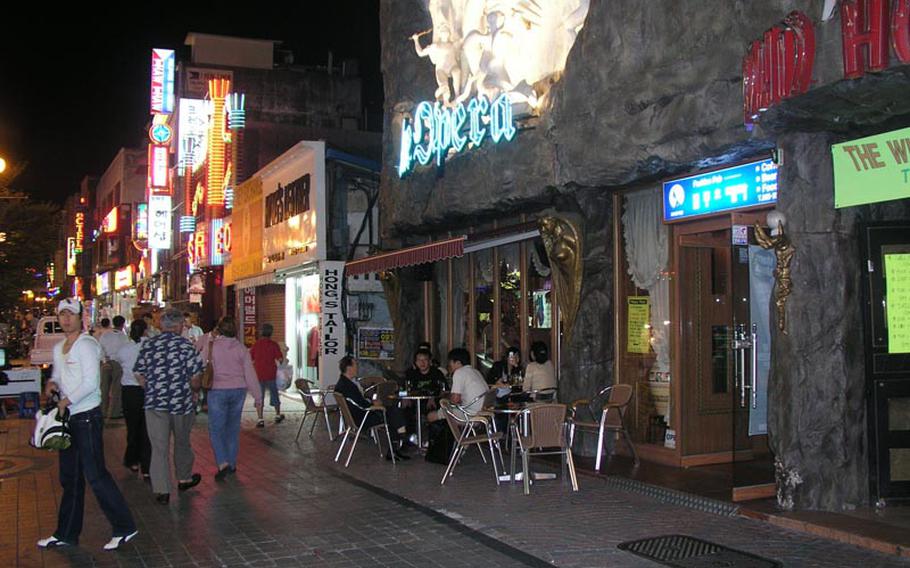Asia-Pacific
Airmen involved in handcuffing incident allowed to leave S. Korea
Stars and Stripes March 11, 2013

About a one minute walk from Osan Air Base in the Songtan section of Pyeongtaek, South Korea, is the Blue Opera Fashion Pub, easy to spot for the fierce winged creature that appears above its entrance. The Blue Opera is one of numerous pubs in Songtan's bustling Shinjang commercial district, which caters largely to U.S. servicemembers. (Franklin Fisher/Stars and Stripes, file)
SEOUL — All seven U.S. airmen under investigation for handcuffing South Korean civilians last summer have been allowed to leave the country, an indicator that they may never face charges in a politically charged case widely viewed here as an example of the military overstepping its authority.
The airmen were allowed to leave when their tours in South Korea ended, with an understanding between the U.S. military and South Korea’s Ministry of Justice that they would return if needed for further questioning, 7th Air Force spokeswoman Maj. Richelle Dowdell said Monday.
The airmen, security forces taking part in a routine town patrol detail on July 5, handcuffed at least two civilians during a dispute over an illegally parked car in a popular pedestrian shopping area about 100 to 150 yards outside an entrance to Osan Air Base.
Osan officials have said the airmen believed the car posed a force protection threat. South Korean authorities said the car was parked too far from the base to pose a credible danger.
A prosecutor with the Pyeongtaek branch of the Suwon Prosecutor’s Office said Monday that the airmen had “not committed a crime worthy of being charged” because they did not seriously injure anyone.
They were allowed to leave South Korea because they have cooperated with authorities and are not viewed as a flight risk, the prosecutor said. He also said their actions during the altercation were not considered serious enough to place them under international hold, meaning they would be prohibited from leaving the country.
He did not know why the investigation had not been completed more than eight months after the incident and said prosecutors do not know when — or if — any charges will be filed.
The 7th Air Force completed its own investigation months ago but has said it will not release the findings until South Korea wraps up its investigation.
Grainy cell phone footage of the incident was aired widely in South Korea. It showed people in civilian clothing surrounding the security patrol and the airmen roughly handling two men on the ground.
The incident highlighted a gray area regarding what actions U.S. military law enforcement personnel can take outside their installations.
Under the status of forces agreement and related rules and regulations, they can conduct patrols there to maintain order and discipline among troops and to monitor U.S. military facilities but are not allowed to enforce South Korean law and can take police action only in case of threat to military property or facilities.
USFK acknowledged in a statement issued in the wake of the handcuffing that rules on the military’s policing authority could be misinterpreted.
“Although the rules are clear, the situation may not be. Actions taken in an attempt to protect the force could easily be misconstrued as acting as law enforcement officials,” the statement said.
Pyeongtaek police chief Park Sang Yung earlier said the airmen should be charged with making illegal arrests. He reversed his position Monday, saying the matter was not serious enough to pursue prosecution and that military officials had apologized for the incident.
He also said USFK regulations and cultural attitudes toward handcuffing differ from those of South Korea, where such restraints are rarely used.
“USFK did not understand our legal culture,” he said, adding that the airmen did not intentionally escalate the situation.
Five airmen were suspended from town patrol duties during the military investigation, which Dowdell has described as an administrative and not punitive procedure. She did not immediately say whether the airmen will face punishment under the Uniform Code of Military Justice.
USFK banned its town patrols from carrying guns after the incident.